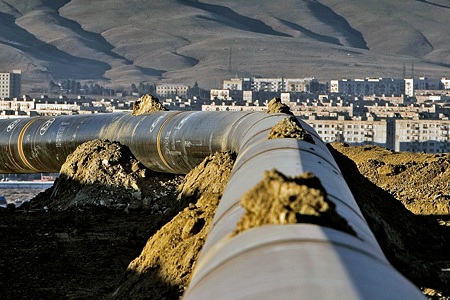SOCAR, Transneft update deal on Baku-Novorossiysk (UPDATE)

By Gulgiz Dadashova
Azerbaijan's state energy company SOCAR and Russian oil pipeline monopoly Transneft -- the operator of the Baku-Novorossiysk pipeline's Russian section - have signed a new deal on the continuation of oil pumping via the pipeline.
The company reported that the new deal that meets interests of both sides will allow supplying Azerbaijani oil to the world market via diversified routes.
The Baku-Novorossiysk pipeline transported the oil produced by SOCAR independently, as well as from onshore fields developed within joint enterprises. Azerbaijan's oil is being shipped from the Novorossiysk port under the name of the Russian export blend, URALS.
Urals -- a mix of heavy and high-grade oil of the Urals with light oil of western Siberia supplied through the Baku-Novorossiysk pipeline and the Druzhba pipeline system -- is traded on world exchanges at a price lower by $4 per barrel than the Azerbaijani crude.
SOCAR exported via the northern pipeline 1.75 million tons in 2013, compared to 2.06 million tonnes in 2012.
The source in the company told Trend news agency that the
agreement will ensure the transportation of Azerbaijani oil via the
Baku-Novorossiysk for one year, until February 2015.
Although the new deal signed, the source noted, SOCAR will further
pump its own oil via Baku-Tbilisi-Ceyhan (BTC) pipeline as
announced earlier. BTC will further supply certain part of SOCAR's
oil to the world market.
SOCAR launched pumping of its oil via the BTC - an effective pipeline through which Azeri Light crude oil, as well as oil from Central Asia, is pumped - from February 15, 2014.
According to forecasts, SOCAR will pump 1.55 million tons of oil
in total in both directions by late 2014, of which 1.02 million
tons will fall on the Baku-Novorossiysk pipeline, and 530,000 tons
- Baku-Tbilisi-Ceyhan pipeline.
The source said the beginning of pumping oil through the
Baku-Novorossiysk expected after February 21.
The tariff for oil pumping was $15.67 per ton until February 2014. The sides didn't unveil the rate of pumping oil through the Baku-Novorossiysk after the signing of a new commercial agreement.
The contract for transiting Azerbaijan's oil via the Baku-Novorossiysk pipeline through the territory of its giant northern neighbor, in effect for 17 years, was revoked in early May.
The Baku-Novorossiysk pipeline (also known as the Northern Route Export Pipeline) is a 1,330-kilometer oil pipeline, which runs from the Sangachal Terminal near Baku to the Novorossiysk terminal at the Black Sea coast in Russia.
As Azerbaijan has no direct access to the open seas, it is in need of more pipelines. So, maintaining oil transportation via the Baku-Novorossiysk pipeline meets Baku's interests in terms of diversification of routes.
Here we are to serve you with news right now. It does not cost much, but worth your attention.
Choose to support open, independent, quality journalism and subscribe on a monthly basis.
By subscribing to our online newspaper, you can have full digital access to all news, analysis, and much more.
You can also follow AzerNEWS on Twitter @AzerNewsAz or Facebook @AzerNewsNewspaper
Thank you!
